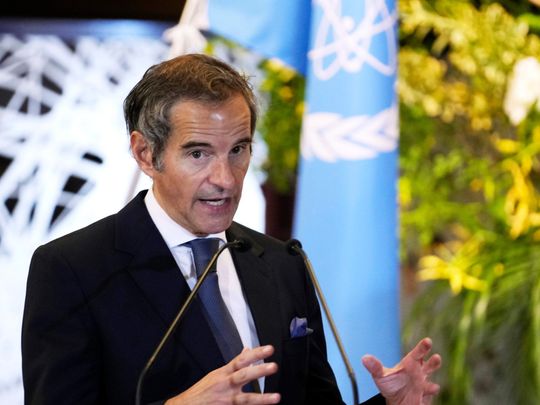
JERUSALEM: Israel told the UN nuclear watchdog on Friday that it would prefer a diplomatic resolution to the standoff over Iran’s nuclear programme but could take independent action, reiterating a long-standing veiled threat to launch preemptive war.
Rafael Grossi, the head of the International Atomic Energy Agency, paid a brief visit to Israel, which has long accused Iran of pursuing nuclear weapons and is opposed to any return to the 2015 nuclear agreement between Tehran and world powers.
Israeli Prime Minister Naftali Bennett “expressed Israel’s deep concern regarding Iran’s continued progress toward achieving nuclear weapons while deceiving the international community by using false information and lies,’’ his office said in a statement.
He “emphasized the urgent need in mobilizing the international community to take action against Iran, using all means, in order to prevent Iran from achieving nuclear weapons.”
“It is essential that Iran does fully comply with its legal binding obligations under the NPT and separately with its comprehensive safeguards agreement with the IAEA without further delay,’’ State Department spokesman Ned Price said Thursday.
Bennett called on the board of governors to deliver a “clear and unequivocal message’’ to Iran.
The warning to Grossi followed calls by Western powers on the IAEA Board of Governors to rebuke Tehran for failing to answer questions on uranium traces at undeclared sites.
That dispute has further clouded so-far fruitless attempts by negotiators to resurrect a 2015 Iran nuclear deal that former US President Donald Trump quit in 2018.
Since Washington’s walkout, Iran - which says its nuclear designs are peaceful - has stepped up uranium enrichment, a process that could produce fuel for bombs.
Bennett “stressed [to Grossi] the importance of the IAEA Board of Governors delivering a clear and unequivocal message to Iran in its upcoming decision”, a statement from Bennett’s office said.
“While it prefers diplomacy in order to deny Iran the possibility of developing nuclear weapons, Israel reserves the right to self-defence and action against Iran to stop its nuclear programme if the international community fails to do so within the relevant time-frame,” it added without elaborating.
Grossi said on Twitter that he had visited Israel at its invitation and “stressed (to Bennett) the importance of IAEA safeguards and the Treaty on the Non-Proliferation of Nuclear Weapons (NPT) for global peace and security”.
The tweet did not explicitly name NPT-signatory Iran.
On Thursday, Iran’s chief nuclear negotiator, Ali Bagheri Kani, told Norway’s NRK that Israel “can only attack Iran in its dreams”.
“And if they do have such a dream, they will never wake up from it,” Iran’s state-run IRNA news agency quoted Bagheri Kani, who is visiting Norway, as saying.
Israel this week signalled strategic reach by going public with an air force strike exercise over the Mediterranean Sea and the rare maneuvering of a naval submarine in the Red Sea.
But some military analysts question if Israel is capable of delivering lasting damage to Tehran’s distant, dispersed and well-defended nuclear facilities - or of contending with the multi-front fighting with Iranian forces and guerrilla allies that could follow.








